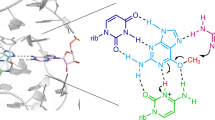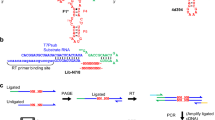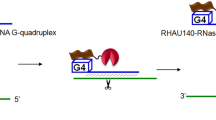Abstract
THERE is much interest in the development of 'designer ribozymes' to target destruction of RNAs in vitro and in vivo1. Engineering of ribozymes with novel specificities requires detailed knowledge of the ribozyme-substrate interaction, and a rigorous evaluation of sequence specificity. The hairpin ribozyme catalyses an efficient and reversible site-specific cleavage reaction2–4. We have used mutagenesis and in vitro selection strategies to show that RNA cleavage and ligation has an absolute requirement for guanosine immediately 3' to the cleavage-ligation site. This G is not required for efficient substrate binding, rather, its 2-amino group is an essential component of the active site required for catalysis.
This is a preview of subscription content, access via your institution
Access options
Subscribe to this journal
Receive 51 print issues and online access
$199.00 per year
only $3.90 per issue
Buy this article
- Purchase on Springer Link
- Instant access to full article PDF
Prices may be subject to local taxes which are calculated during checkout
Similar content being viewed by others
References
Cech, T. R. J. Am. med. Assoc. 260, 3030–3034 (1988).
Feldstein, P. A., Buzayan, J. M. & Bruening, G. Gene 82, 53–61 (1989).
Hampel, A. & Tritz, R. Biochemistry 28, 4929–4933 (1989).
Haseloff, J. & Gerlach, W. L. Gene 82, 43–52 (1989).
Chowrira, B. M. & Burke, J. M. Biochemistry 30, 8518–8522 (1991).
van Tol, H. et al. Nucleic Acids Res. 18, 1971–1975 (1990).
Koizumi, M. & Ohtsuka, E. Biochemistry 30, 5145–5150 (1991).
Ruffner, D. E., Stormo, G. D. & Uhlenbeck, O. C. Biochemistry 29, 10695–10702 (1990).
Green, C. J. & Vold, B. S. J. biol. Chem. 263, 252–257 (1988).
Burkard, U. et al. J. biol. Chem. 263, 2447–2451 (1988).
Carter, B. J. et al. J. biol. Chem. 265, 7100–7103 (1990).
Cech, T. R. A. Rev. Biochem. 59, 543–556 (1990).
Rubino, L. et al. J. gen. Virol. 71, 1897–1903 (1990).
Hampel, A. et al. Nucleic Acids Res. 18, 299–304 (1990).
Milligan, J. F. & Uhlenbeck, O. C. Meth. Enzm. 180, 51–62 (1989).
Pyle, A. M., McSwiggen, J. A. & Cech, T. R. Proc. natn. Acad. Sci. U.S.A. 87, 8187–8191 (1990).
Fedor, M. J. & Uhlenbeck, O. C. Proc. natn. Acad. Sci. U.S.A. 87, 1668–1672 (1990).
Doudna, J. A. et al. J. org. Chem. 55, 5547–5549 (1990).
Author information
Authors and Affiliations
Rights and permissions
About this article
Cite this article
Chowrira, B., Berzal-Herranz, A. & Burke, J. Novel guanosine requirement for catalysis by the hairpin ribozyme. Nature 354, 320–322 (1991). https://doi.org/10.1038/354320a0
Received:
Accepted:
Issue Date:
DOI: https://doi.org/10.1038/354320a0
This article is cited by
-
Fabrication of pRNA nanoparticles to deliver therapeutic RNAs and bioactive compounds into tumor cells
Nature Protocols (2013)
-
Assembly of Therapeutic pRNA-siRNA Nanoparticles Using Bipartite Approach
Molecular Therapy (2011)
-
Modulating RNA structure and catalysis: lessons from small cleaving ribozymes
Cellular and Molecular Life Sciences (2009)
-
The RNA World on Ice: A New Scenario for the Emergence of RNA Information
Journal of Molecular Evolution (2005)
-
Bacterial virus phi29 pRNA as a hammerhead ribozyme escort to destroy hepatitis B virus
Gene Therapy (2003)
Comments
By submitting a comment you agree to abide by our Terms and Community Guidelines. If you find something abusive or that does not comply with our terms or guidelines please flag it as inappropriate.



